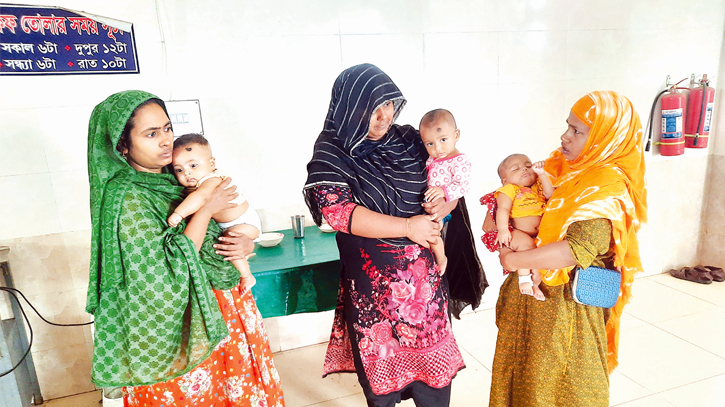
The children’s department at Sadar Hospital grapples with a 70% surge in pneumonia cases, pushing capacity limits. Photo: Messenger
Jhenaidah is currently grappling with an alarming rise in pneumonia cases among children, with the pediatric department of Sadar Hospital witnessing a daily surge in patient numbers.
As of Friday afternoon, the children's department is grappling with an influx of 160 admissions, of which a staggering 70 percent are diagnosed with pneumonia. In the past 24 hours alone, 38 new cases have been admitted, pushing the hospital's capacity to its limits. With four times more patients than available beds, many are compelled to occupy rooms and even the floor outside, reflecting the severity of the situation.
Alarmingly, the daily admission rate continues unabated, with 30 to 40 new children seeking medical attention daily. However, pneumonia is not the sole health concern; cases of jaundice and diarrhea are also on the rise.
Salma Khatun, a housewife from Madhupur village in Sadar Upazila, shared that her son had been suffering from a cold since the 8th and, although his condition improved after admission, the overcrowded conditions forced her to stay on the floor without a bed, raising concerns about a potential relapse.
Ratua Khatun from Narayankandi village in Jhenaidah, whose one-and-a-half-month-old baby Ayan has pneumonia, described a cycle of hospitalization and recovery, followed by a recurrence of symptoms. Ayan is currently receiving medication and oxygen through a nasal tube due to chest pain.
Champa Begum of Goalpara village mentioned that her 6-month-old son Salman has been in the hospital for six days with cold and cough, noting a reduction in the severity of his symptoms.
Dr. Anowarul Islam, a pediatrician at Jhenaidah Sadar Hospital, attributed the increased prevalence of viral pneumonia among children to climate change. While no child has died of pneumonia so far, the overall physical condition of admitted patients is improving slowly. The limited space in the pediatric department has led to cross-infections, exacerbated by a crowded environment with many relatives.
Dr. Islam highlighted the challenges in service provision, mentioning that each shift has only one pediatrician, one medical officer, and two nurses. The high patient load makes it difficult to provide adequate care and services. Immediate attention and additional resources are crucial to address this health crisis effectively.
Jhenaidah is facing a critical health crisis characterized by a sharp increase in pediatric pneumonia cases at Sadar Hospital. While efforts are being made to address the escalating problem, urgent measures, such as increased medical staff and resources, are essential to ensure prompt and effective care for the affected children. The community, healthcare professionals, and authorities need to work collaboratively to mitigate the current health challenges and prevent further complications in the region.
Messenger/Fameema








